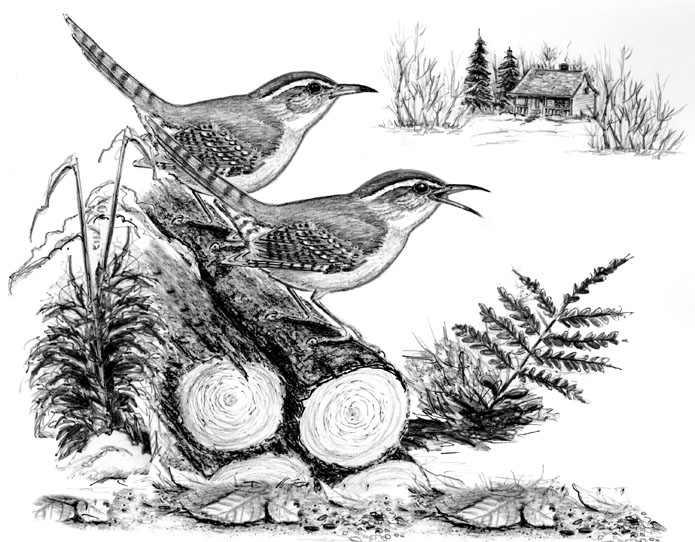
Dear Bird Folks,
I read in one of your columns that birds sing in the spring to attract a mate. Well, the Carolina Wrens in my yard apparently donít read your columns because they are singing more than ever. Why are these birds singing now (in the fall)? Are they late nesters or just mixed up?
– Ralph, Orleans, MA.
Good for you, Ralph,
While I’m not happy to learn that wrens aren’t reading my column, I have to give you credit. You made a correct observation by noticing that many of our birds have quieted down. In the fall the only birds we usually hear are our old pals the crows, and a few jays. Suddenly, however, the little Carolina Wrens have become nearly as loud as the crows, and thatís loud. I hear them singing all around town and especially in my yard. One wren has gotten so loud I can even hear it singing while I’m blasting my stereo. It’s hard to distract me while I’m rocking out to The Partridge Family, but this bird can do it.
What I wrote about birds singing is true. They do sing in the spring to attract a mate, but they also sing to announce their territories. Most birds vigorously defend a breeding territory, but back off as soon as the nesting is season is over. Birds are like pro athletes. When it’s game time they hate each other, but as soon as the action stops all the blustering comes to an end. They then hang out together and compare commercial endorsements. The feisty Carolina Wrens aren’t that phony; they hate each other year-round, 24/7, 365, and then some.
Carolina Wrens are the only wrens in the East that don’t migrate. The idea of making those long, dangerous flights, packing and unpacking, stopping and starting the mail and draining the water pipes for the winter seems silly to them. When they find a location they like, they stay there and never leave. The only thing they have to do is defend their location from other usurping Carolina Wrens. Right now you might be thinking: If these wrens don’t migrate, where would the usurping wrens come from? Shouldn’t everybody already have a place to live? Throughout most of the year that may be true, but in the fall there are thousands of newly hatched wrens looking for a place to live. Good luck to them. Finding a new territory wonít be easy. The best places are already taken and they’ll be chased away if they get too close to another bird’s claim. Young Carolina Wrens are the skate boarders of the bird world. They really aren’t doing anything wrong, yet they are constantly told to move on.
While most songbirds form couples in the spring, Carolina Wrens often pair up in the fall. Finding and holding a productive territory is critical to the survival of these non-migratory birds. They may not live through the winter if they can’t find and hold a territory that contains adequate food and shelter. They pair up in the fall because a new wren couple has a much better chance of defending a territory than a single male does, and a single female has no chance at all. Sorry, libbers, that’s just the way it is.
For the past few weeks there has been a serious turf war going on in my yard. Every day I wake up to the sound of screaming Carolina Wrens. It seems a new couple is trying to claim my yard as their own and the local pair is having none of it. This morning the resident male wren was yelling the nastiest things I’ve ever heard a bird say. It got so bad that I had to cover my kid’s ears. Eventually the established pair succeeded in driving off the challengers, but the fighting didn’t end there. I could hear the wrens in a nearby neighborhood yelling, too. It appears that the new couple tried to move down the street, but once again, they were told by the locals to move along, just like skateboarders.
Naturally landscaped yards with lots of thickets, leaf litter and a brush pile or two are appealing to Carolina Wrens. You are far less likely to find them in manicured yards, like the ones featured on the cover of Pesticide Monthly. These wrens will also come to our feeders, but they aren’t as regular as finches and chickadees. Every once in a while, I’ll see them take a bit of shelled sunflower or suet. They will also use birdhouses but once again, not in a major way. They are more likely to build a nest where you would least expect them to, and often where you’d rather they didn’t. Planters, mailboxes, and flowerpots have been used, with covers of propane tanks being one of their favorite, and most annoying, places. This year I’ve had two customers come in with coffee cans that had been used by nesting wrens. Wrens in coffee cans, eh? That explains where all their hyperness comes from.
Your wren’s loud singing may continue for a few more weeks, Ralph (only the males sing, by the way). If the noise becomes too much for you to take, you can crank up your stereo to block it out. I recommend putting on The Partridge Family. The Partridge Family makes everything better.